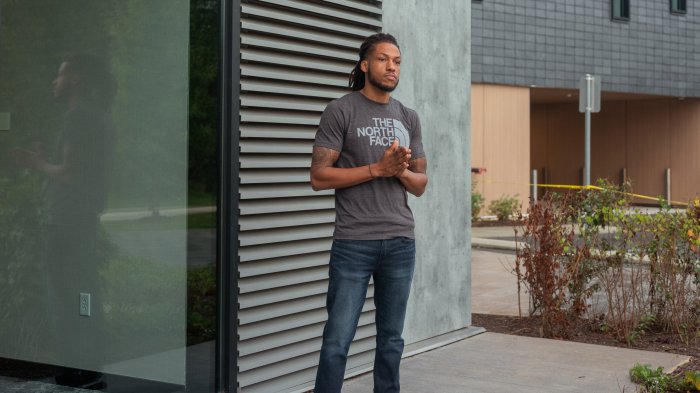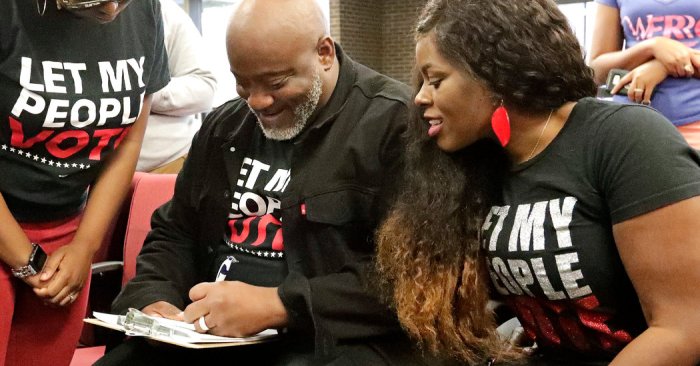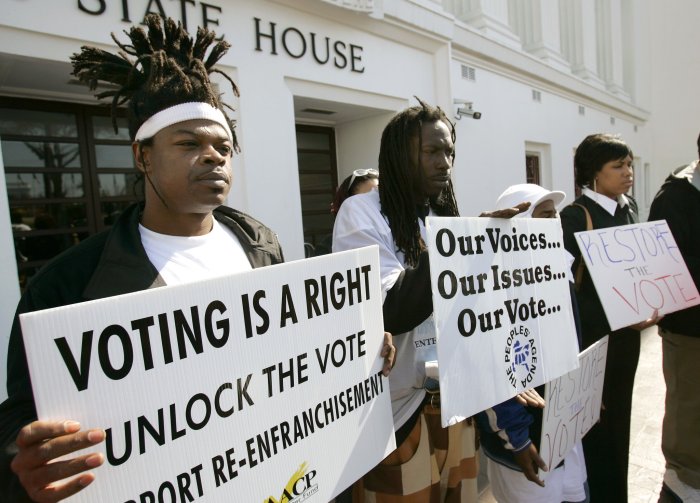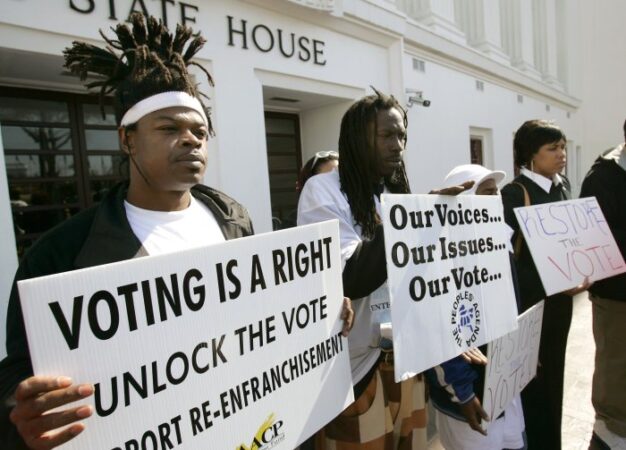Is it federal law for felons not to vote? The answer is not straightforward. While there is no federal law explicitly prohibiting felons from voting, the right to vote for felons is primarily governed by state laws, which vary significantly across the country. This complex landscape of state-level regulations, combined with the historical context of felon disenfranchisement, raises crucial questions about the balance between public safety and the fundamental right to participate in democracy.
Throughout history, the United States has grappled with the question of whether and how felons should be allowed to vote. From the early days of the republic to the present, the debate has been fueled by competing concerns about rehabilitation, public safety, and the principle of equal citizenship. This article delves into the historical context, current legal framework, and ongoing arguments surrounding felon voting rights, shedding light on a complex and multifaceted issue.
Historical Context of Felon Voting Rights
The right to vote is a cornerstone of American democracy, but the history of felon voting rights in the United States is marked by complex and often discriminatory practices. This history reveals a long-standing tension between the principles of rehabilitation and punishment, with the disenfranchisement of felons reflecting a societal belief that convicted individuals forfeit certain rights as a consequence of their crimes.
Evolution of Felon Voting Rights
The evolution of felon voting rights in the United States can be traced back to the early days of the Republic. Initially, most states allowed felons to vote, even those convicted of serious crimes. However, this practice began to change in the late 19th century, as states increasingly adopted laws disenfranchising felons, often motivated by concerns about the political influence of newly freed Black Americans following the Civil War.
- Post-Civil War Era: Following the Civil War, many Southern states enacted disenfranchisement laws specifically targeting Black Americans, including laws that denied voting rights to those convicted of crimes. These laws were often designed to suppress Black political participation and maintain white supremacy.
- Jim Crow Era: During the Jim Crow era, disenfranchisement laws were further used to disenfranchise Black Americans. These laws were often applied selectively, with Black individuals being more likely to be convicted of crimes and subsequently denied the right to vote.
- 20th Century: Throughout the 20th century, disenfranchisement laws became increasingly common, with most states enacting laws that denied voting rights to felons. These laws were often justified on the grounds that felons had forfeited their right to vote by committing crimes and that disenfranchisement was necessary to deter future criminal activity.
Landmark Court Cases
Several landmark court cases have addressed the issue of felon voting rights, shaping the legal landscape and sparking ongoing debates.
- Richardson v. Ramirez (1974): The Supreme Court ruled that states could constitutionally disenfranchise felons, upholding the principle that the right to vote is not a fundamental right that is protected from state infringement. This decision was based on the interpretation of the 14th Amendment, which guarantees equal protection under the law, but allows for exceptions for those convicted of crimes.
- Hunter v. Underwood (1985): The Supreme Court struck down an Alabama law that permanently disenfranchisement individuals convicted of crimes involving moral turpitude, finding that the law was racially discriminatory and violated the 14th Amendment. This decision highlighted the potential for disenfranchisement laws to have a disparate impact on racial minorities.
- Bush v. Gore (2000): While not directly related to felon voting rights, this case highlighted the importance of ensuring fair and equal access to the ballot box. The Supreme Court’s decision to halt the recount in Florida, which ultimately decided the presidential election, raised concerns about the potential for disenfranchisement and the need for safeguards to protect voting rights.
Rationale for Disenfranchisement
The rationale for disenfranchisement of felons has evolved over time, with arguments often centering on themes of punishment, deterrence, and public safety.
- Punishment: Proponents of disenfranchisement argue that it serves as a form of punishment for felons, depriving them of a fundamental right as a consequence of their criminal behavior. This argument suggests that disenfranchisement is a necessary component of the justice system, reinforcing the seriousness of criminal offenses and deterring future crime.
- Deterrence: Some argue that disenfranchisement acts as a deterrent, discouraging individuals from committing crimes for fear of losing their voting rights. This argument suggests that the threat of disenfranchisement can motivate individuals to avoid criminal activity, contributing to a safer society.
- Public Safety: Concerns about public safety are also often cited as justification for disenfranchisement. Proponents of this argument suggest that felons, having demonstrated a disregard for the law, pose a threat to public safety and should not be entrusted with the right to vote.
Arguments Against Disenfranchisement
Opponents of felon disenfranchisement argue that it undermines the principles of rehabilitation and civic engagement, while also disproportionately affecting marginalized communities.
- Rehabilitation: Critics argue that disenfranchisement hinders the process of rehabilitation by denying felons a key aspect of civic participation and social integration. They argue that the right to vote can be a powerful tool for encouraging individuals to re-engage in society and contribute to their communities.
- Civic Engagement: Disenfranchisement can discourage felons from participating in the political process, limiting their ability to advocate for policies that could benefit them and their communities. This can perpetuate a cycle of disengagement and marginalization, hindering efforts to address issues related to crime and recidivism.
- Disparate Impact: Disenfranchisement laws have a disproportionate impact on racial minorities, particularly Black Americans, who are more likely to be incarcerated and subsequently lose their voting rights. This disparity highlights the potential for disenfranchisement to perpetuate racial inequalities and undermine the principles of equal protection under the law.
Federal Law and Felon Voting Rights

The question of whether felons have the right to vote is a complex one, with various federal and state laws influencing the process. While there is no single federal law explicitly prohibiting felons from voting, the federal government does play a role in regulating felon voting rights. This section explores the current state of federal law regarding felon voting rights, the role of the Voting Rights Act of 1965, and the constitutional arguments surrounding the federal government’s authority to regulate felon voting.
Federal Law and Felon Voting Rights
The Constitution of the United States does not explicitly address the issue of felon voting rights. However, the 14th Amendment guarantees equal protection under the law, which has been interpreted by the Supreme Court to mean that states cannot arbitrarily disenfranchise felons. This interpretation has led to a patchwork of state laws regarding felon voting rights, with some states automatically restoring voting rights upon completion of a sentence, while others impose restrictions like waiting periods or requiring a pardon.
The Voting Rights Act of 1965 and Felon Voting Rights, Is it federal law for felons not to vote
The Voting Rights Act of 1965 (VRA) is a landmark piece of legislation that prohibits racial discrimination in voting. While the VRA primarily addresses racial discrimination, it also has implications for felon voting rights. The VRA prohibits states from enacting laws that disproportionately disenfranchise minority voters, and this has been used to challenge some state laws that restrict felon voting. For example, in 2013, the Supreme Court struck down a section of the VRA that required certain states with a history of racial discrimination to obtain federal preclearance before changing their voting laws. This decision has made it more difficult to challenge state laws that disproportionately disenfranchise minority voters, including laws that restrict felon voting.
Constitutional Arguments Surrounding Federal Regulation of Felon Voting
The extent to which the federal government can regulate felon voting rights is a matter of ongoing debate. Some argue that the federal government has a limited role in regulating voting, and that states should have the primary authority to determine who is eligible to vote. Others argue that the federal government has a responsibility to ensure that all citizens have the right to vote, and that this includes protecting the voting rights of felons.
The debate over federal regulation of felon voting rights is likely to continue. It is a complex issue with important implications for both individual rights and the democratic process.
State Laws and Felon Voting Rights

While federal law does not explicitly prohibit felons from voting, the matter of felon voting rights is primarily governed by individual state laws. These laws vary significantly across the country, resulting in a complex patchwork of regulations that can be challenging to navigate.
State Laws and Felon Voting Rights: A Comparative Overview
The following table provides a snapshot of the different state laws regarding felon voting rights, outlining the criteria for restoration, waiting periods, and permanent disenfranchisement:
| State | Restoration Criteria | Waiting Period | Permanent Disenfranchisement |
|---|---|---|---|
| Alabama | Completion of sentence, including parole and probation | None | No |
| Alaska | Completion of sentence, including parole and probation | None | No |
| Arizona | Completion of sentence, including parole and probation | None | No |
| Arkansas | Completion of sentence, including parole and probation | None | No |
| California | Completion of sentence, including parole and probation | None | No |
| Colorado | Completion of sentence, including parole and probation | None | No |
| Connecticut | Completion of sentence, including parole and probation | None | No |
| Delaware | Completion of sentence, including parole and probation | None | No |
| Florida | Completion of sentence, including parole and probation, and payment of all fines and fees | None | Yes, for certain felonies |
| Georgia | Completion of sentence, including parole and probation | None | No |
| Hawaii | Completion of sentence, including parole and probation | None | No |
| Idaho | Completion of sentence, including parole and probation | None | No |
| Illinois | Completion of sentence, including parole and probation | None | No |
| Indiana | Completion of sentence, including parole and probation | None | No |
| Iowa | Completion of sentence, including parole and probation | None | No |
| Kansas | Completion of sentence, including parole and probation | None | No |
| Kentucky | Completion of sentence, including parole and probation | None | No |
| Louisiana | Completion of sentence, including parole and probation | None | No |
| Maine | Completion of sentence, including parole and probation | None | No |
| Maryland | Completion of sentence, including parole and probation | None | No |
| Massachusetts | Completion of sentence, including parole and probation | None | No |
| Michigan | Completion of sentence, including parole and probation | None | No |
| Minnesota | Completion of sentence, including parole and probation | None | No |
| Mississippi | Completion of sentence, including parole and probation | None | No |
| Missouri | Completion of sentence, including parole and probation | None | No |
| Montana | Completion of sentence, including parole and probation | None | No |
| Nebraska | Completion of sentence, including parole and probation | None | No |
| Nevada | Completion of sentence, including parole and probation | None | No |
| New Hampshire | Completion of sentence, including parole and probation | None | No |
| New Jersey | Completion of sentence, including parole and probation | None | No |
| New Mexico | Completion of sentence, including parole and probation | None | No |
| New York | Completion of sentence, including parole and probation | None | No |
| North Carolina | Completion of sentence, including parole and probation | None | No |
| North Dakota | Completion of sentence, including parole and probation | None | No |
| Ohio | Completion of sentence, including parole and probation | None | No |
| Oklahoma | Completion of sentence, including parole and probation | None | No |
| Oregon | Completion of sentence, including parole and probation | None | No |
| Pennsylvania | Completion of sentence, including parole and probation | None | No |
| Rhode Island | Completion of sentence, including parole and probation | None | No |
| South Carolina | Completion of sentence, including parole and probation | None | No |
| South Dakota | Completion of sentence, including parole and probation | None | No |
| Tennessee | Completion of sentence, including parole and probation | None | No |
| Texas | Completion of sentence, including parole and probation | None | No |
| Utah | Completion of sentence, including parole and probation | None | No |
| Vermont | Completion of sentence, including parole and probation | None | No |
| Virginia | Completion of sentence, including parole and probation | None | No |
| Washington | Completion of sentence, including parole and probation | None | No |
| West Virginia | Completion of sentence, including parole and probation | None | No |
| Wisconsin | Completion of sentence, including parole and probation | None | No |
| Wyoming | Completion of sentence, including parole and probation | None | No |
The table reveals significant variations in state laws. Some states, like Alabama, Alaska, and Arizona, do not have any waiting periods or permanent disenfranchisement for felons. In contrast, Florida has a complex system that includes a waiting period and permanent disenfranchisement for certain felonies. These disparities can have a significant impact on voter turnout and political participation among formerly incarcerated individuals.
Impact of Felon Voting Restrictions

Felon voting restrictions, which vary significantly across the United States, have a multifaceted impact on the political landscape. The disenfranchisement of individuals with felony convictions can influence voter turnout, electoral outcomes, and the representation of marginalized communities. Examining the potential effects of these restrictions is crucial for understanding their implications for democratic principles and civic participation.
Impact on Voter Turnout and Electoral Outcomes
The disenfranchisement of felons can potentially suppress voter turnout, especially in communities with high rates of incarceration. This can lead to a skewed representation of the electorate, potentially impacting the outcome of elections. For example, in states with high rates of felon disenfranchisement, the voices of individuals with felony convictions may be disproportionately silenced, potentially impacting the representation of their interests in government. Additionally, the absence of these voters could influence the outcome of close elections, potentially giving an advantage to candidates who do not prioritize the needs of formerly incarcerated individuals.
Implications for Democratic Principles and Civic Participation
Felon disenfranchisement raises concerns about the principles of democracy and civic participation. The right to vote is a fundamental cornerstone of a democratic society, and denying this right to individuals based solely on their criminal history can undermine the principles of equality and fairness. This disenfranchisement can create a sense of alienation and disengagement from the political process among formerly incarcerated individuals, potentially hindering their reintegration into society.
Potential Solutions
Addressing the challenges associated with felon voting restrictions requires exploring potential solutions that promote civic engagement and restore voting rights. Some solutions include:
- Automatic Restoration of Voting Rights: This approach automatically restores voting rights to individuals upon completion of their sentence, including parole or probation. It eliminates the need for complex procedures and applications, promoting equal access to the ballot box.
- Alternative Methods of Civic Engagement: Exploring alternative methods of civic engagement for formerly incarcerated individuals can empower them to participate in the political process. This could include opportunities for community involvement, public policy advocacy, and engagement in local government initiatives.
- Public Education and Awareness Campaigns: Raising public awareness about the impact of felon voting restrictions and promoting understanding of the challenges faced by formerly incarcerated individuals can foster a more inclusive and just society. This can involve educational campaigns, community forums, and media outreach to address misconceptions and promote empathy.
Final Thoughts: Is It Federal Law For Felons Not To Vote
The question of whether felons should have the right to vote remains a contentious issue, with strong arguments on both sides. While the federal government does not have a specific law prohibiting felons from voting, state laws play a crucial role in determining who can and cannot participate in elections. Understanding the historical context, legal complexities, and ethical considerations surrounding felon disenfranchisement is essential for fostering informed dialogue and ensuring a more inclusive and representative democracy.
FAQ
What is the rationale behind disenfranchising felons?
Historically, the rationale for disenfranchising felons has been based on arguments about public safety, crime deterrence, and the potential for voter fraud. However, these arguments have been challenged by proponents of felon voting rights who emphasize the importance of rehabilitation and civic engagement.
What are the potential solutions to address the challenges associated with felon voting restrictions?
Potential solutions include automatic restoration of voting rights upon completion of a sentence, alternative methods of civic engagement for felons, and comprehensive criminal justice reform that addresses the root causes of crime and recidivism.
What are the ethical implications of disenfranchising felons?
Disenfranchising felons raises ethical concerns about their reintegration into society and the principle of equal participation in democracy. Opponents argue that denying voting rights to felons reinforces a sense of social exclusion and undermines their ability to contribute to the democratic process.
